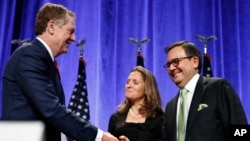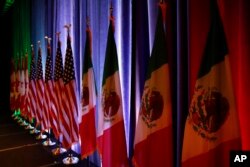The United States, Mexico and Canada opened negotiations Wednesday to reform the North American Free Trade Agreement, with U.S. Trade Representative Robert Lighthizer demanding at the outset an overhaul that would cut U.S. trade deficits and increase the use of regional parts for autos produced in North America.
At an opening news conference in Washington, Lighthizer said U.S. President Donald Trump does not want "a mere tweaking" of NAFTA, which has "fundamentally failed many, many Americans and needs major improvement."
The 1994 trade deal was one of Trump's top priorities during his run for the White House, often calling NAFTA "the worst trade deal in history," and one that has unfairly swollen the U.S. trade deficit with Mexico while allowing manufacturing jobs to migrate there. The U.S. had a $64-billion trade goods deficit with Mexico last year.
Mexican economic minister Ildefonso Guajardo Villarreal defended the pact, saying major revisions are not necessary. "The issue is not tearing apart" NAFTA, but negotiating how the agreement can "even work better."
Canadian Foreign Minister Chrystia Freeland also came to NAFTA's defense and said any decisions on the modernization of the pact should not be made by simply measuring trade surpluses or deficits.
"We are the biggest client of the United States," she said. "Canada buys more from the U.S. than China, UK and Japan combined. Trade is about people. It's about creating the best possible conditions for jobs, for growth and for prosperity."
US stresses need for 'balance and reciprocity'
But Lighthizer said negotiators must "ensure that the huge trade deficits do not continue and we have balance and reciprocity." He added that "The rules of origin, particularly on autos and auto parts, must require higher NAFTA content and substantial U.S. content."
Addressing the imbalance is a key U.S. goal in the talks, along with seeking to do away with a dispute mechanism the three countries use to resolve disagreements.
Negotiators will use multiple sessions to try to come up with reforms with the aim of finishing their work before the end of the year. If the process stretches into 2018, there are worries the process could be complicated by a presidential election in Mexico and U.S. congressional elections.
A U.S. trade official who spoke to reporters on the condition of anonymity said the U.S. is seeking a "more balanced, reciprocal trade agreement that supports high-paying jobs for Americans and grows the U.S. economy."
Vow to cause no harm
Gary Hufbauer, an economist with the Washington-based Peterson Institute for International Economics, told VOA that renegotiating NAFTA will not bring back U.S. manufacturing jobs.
"Most economists don't think that's possible but, obviously, the president does and he's the president," Hufbauer told VOA.
He said the topics under discussion will be ones such as state-owned enterprises, digital commerce, labor and environment. He also said U.S. negotiators have promised to work in a way that will "cause no harm."
"What that means is that if they're doing anything which causes Mexico or Canada to limit, for example, U.S. agricultural exports, which are quite substantial to both countries, that would be harm. And that would be harm to red states. So, that's a line they don't want to cross," Hufbauer said.














